#because this is a solid series that deserves more attention in english-language spaces
Explore tagged Tumblr posts
Text
So I decided to pick up physical copies of The Vampire and His Pleasant Companions from Yen Press on a whim the other day. I've been in such a nostalgia hole about Ragawa's works thanks to the Hanayume 50th celebrations and I remembered her manga adaptation of Konohara Narise's novels had restarted not that long ago. It made sense to get the books and begin a catchup re-read before the fifth volume comes out in English.
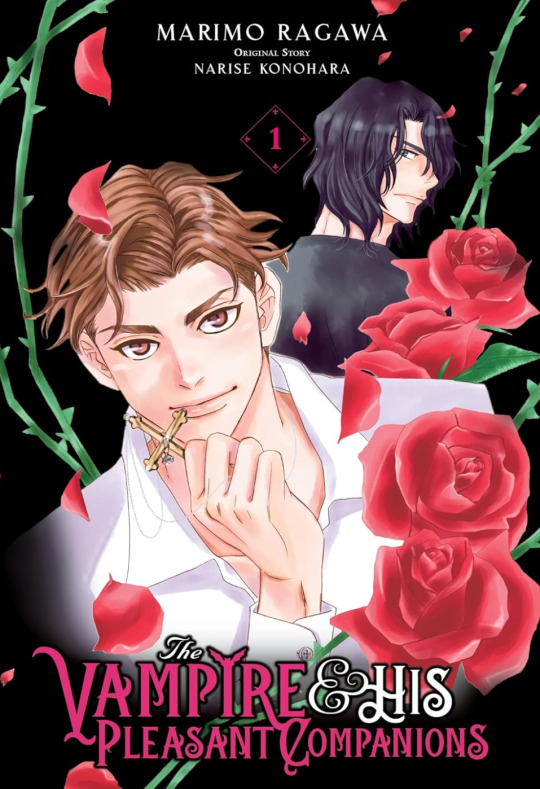
I'll be honest, I don't remember much about the Kyuketsuki to Yukai na Nakamatachi novels or manga from when I first encountered them. I had the first two manga volumes in Japanese at one point, but gave them away when the manga went on hiatus years ago. However, upon beginning my catchup re-read in English I was struck by how much the story resonated with me now.
If you've never read the series before now, long story short from Yen Press, "When a vampire from Nebraska named Al gets frozen in bat form, he winds up in Japan under the care of a dark and mysterious man covered in a bloody scent!"
I'd like to get into why I think this series is worth picking up now and for that it's probably easier to throw my ramblings under a cut.
I feel like the humorous elements of the series are what get talked about in the (admittedly scant) English language reviews for the series and, while the whole setup can be quite amusing, the more serious elements are what actually makes it stand out from other vampire tales with romantic elements. While everything is exaggerated, there are some very "real" aspects that help The Vampire and His Pleasant Companions stand out in an endless sea of vampire tales.
For example, Al being bitten by a vampire wasn't a ticket to easy street. There was nothing glamorous about what happened to him. That bite ruined his life and through no fault of is own, he rapidly became destitute. Vampirism in fiction is often shown leading characters to social isolation, but not necessarily to poverty. Given that Al has lost everything that connected him to his previous life, it makes sense that in our current capitalistic society he'd also lose access to even the most basic things our societal identities afford us -- including housing.
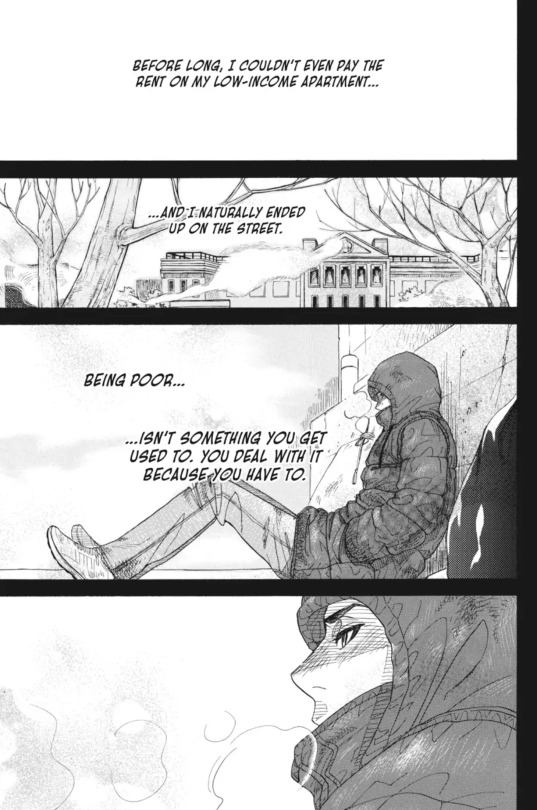
So yes, it's amusing that this bat-boy ended up flash frozen and shipped with some meat to Japan. However, the circumstances that led up to that outcome are given the weight they deserve. You truly do feel for Al in these moments because haven't we all been, at one time or another in our lives, perilously close to losing everything? These fleeting glimpses at the past sting in otherwise rollicking segments of the story as they should. Everything beautiful in Al's present is something that he didn't have during his lowest points and you truly feel for him as he works to prolong these moments.
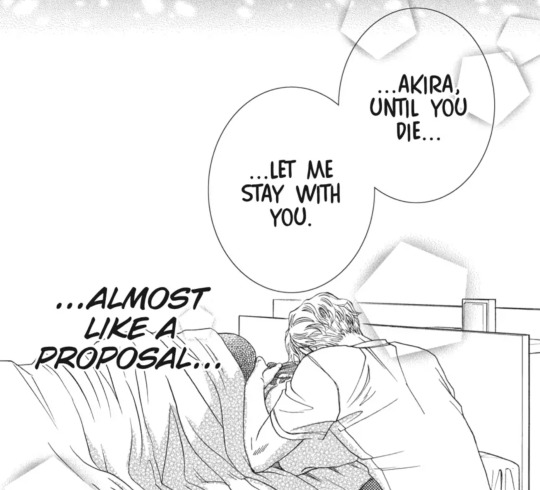
Another serious moment that lifts the series even higher in my eyes is when it becomes aparent that Akira has access to human remains. Rather than handwaving away the access to blood as a convenient way to get Al the nutrition he needs, a significant amount of time is dedicated to the ethics surrounding the situation. The gravity with which all lives should be handled post-mortem and just a generally respectful examination of embalming as a process.
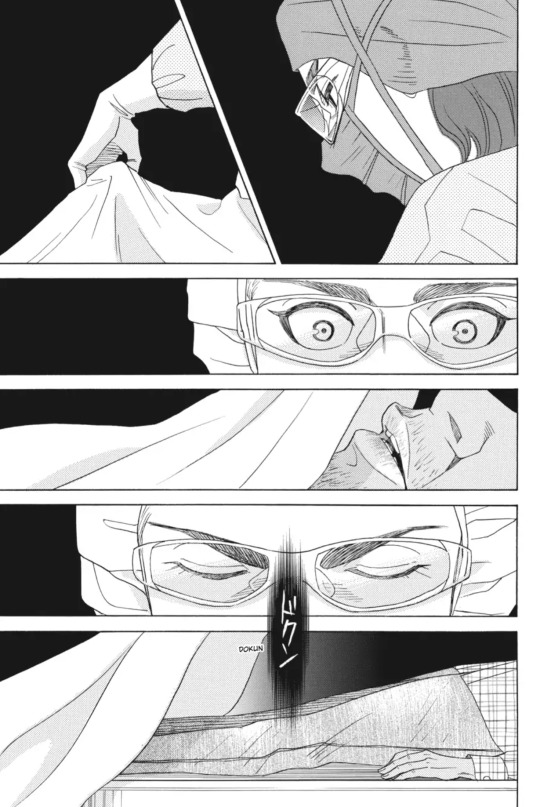
Unsurprisingly, I find the portrayal of Al's "incomplete" vampirism as a form of disability to be a compelling take on the mythos too. Al gets almost none of the "benefits" of being a vampire due to the whole process "not being done properly." What this leaves him with are a lot of things that make his everyday life different from not just humans, but "complete" vampires as well.
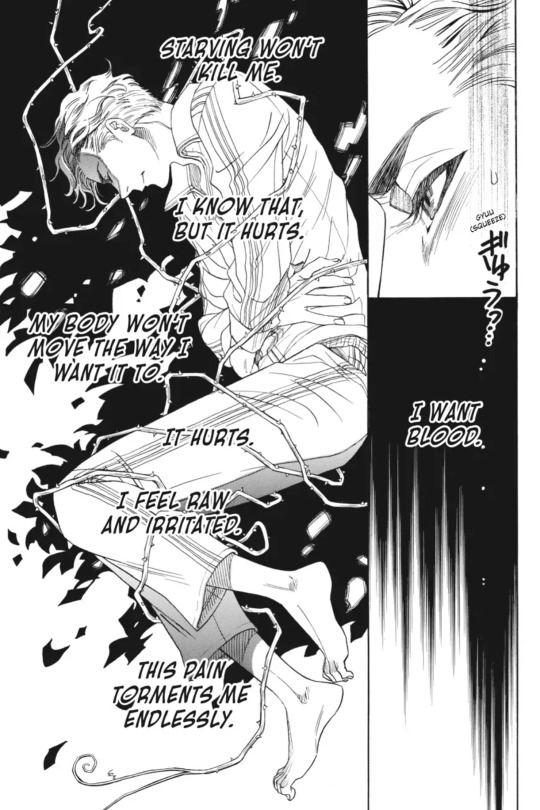
These differences mean he struggles to feed himself properly, feels significant levels of pain, and his body is often weak or doesn't behave the way he wants it to. The cause here is obviously fiction, but the way Al's acquired disability impacts his capacity to function to an acceptable level in a society of "normal" folks (both human and vampire) really struck me as ringing true, at least for myself and my own disabilities.
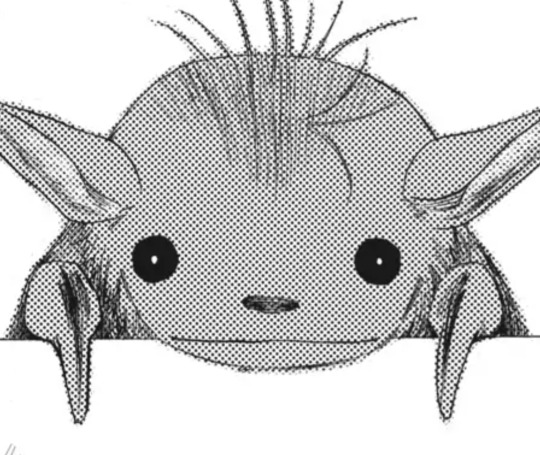
Yeah, I'm not going to turn into an adorable bat (and truly, bat Al is A D O R A B L E) but the struggle to make use of the few good hours in a day when my body works to a degree, that's so goddamn real. Al wants to contribute to the household, to pay back Akira and to be a functioning member of society... but it's not as straightforward for him as it is for others and that's something I appreciate being explored here.
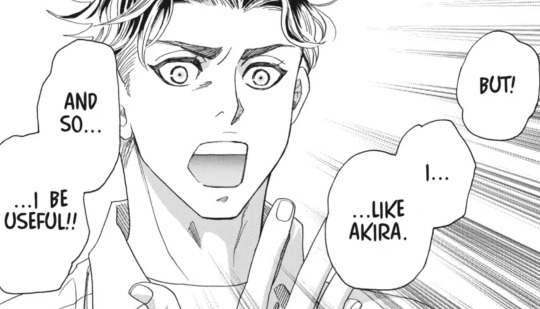
Another thing that stands out to me is Akira's sexuality. While there are a lot of misunderstandings with Al and Akira that lead to people assuming they're lovers, when Akira is pushed into a corner about having a lover he shuts this down by describing himself as being frigid or having a low libido (in very blunt language).
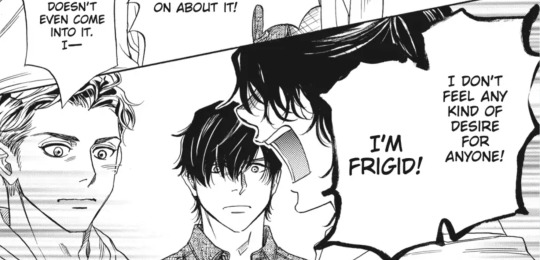
I feel like the depth of this is conveyed well in the English translation by the subsequent line:
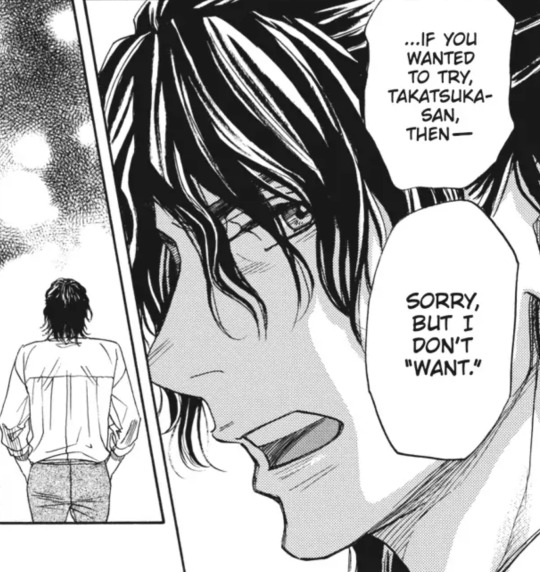
While at this point in the series Akira hasn't labeled his sexuality as being either demisexual or asexual, this is definitely something that it feels like the narrative is leaning towards. Particularly when Al clarifies the difference, in his limited language skills, between the physical and the romantic.
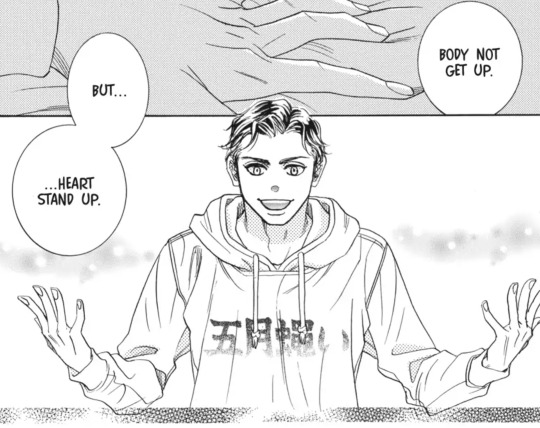
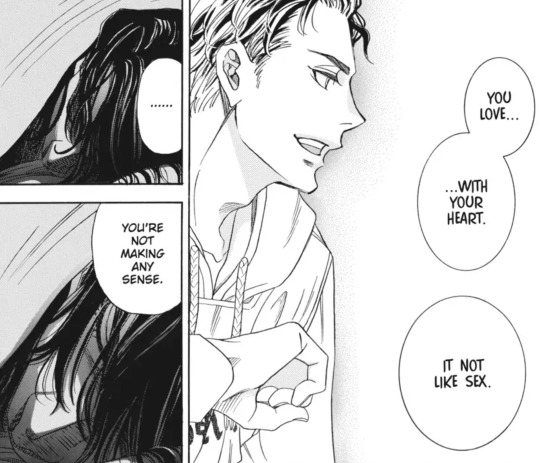
Akira is still figuring out what is comfortable for him in terms of dealing with people, so it makes sense that his progress regarding intimacy has only accelerated after meeting Al. The batty vampire is pushing him towards understanding more about himself and how he chooses to interact with those around him, but the ball is still very much in Akira's court regarding whether he'd like to explore either the physical or emotional aspects of their relationship further. I found that really refreshing?
That this story allows the dark-haired, brooding hero who is one part of our lead will-they-or-won't-they, to assert that he doesn't feel the same level of physical attraction that others do. That he isn't entirely confident in this either, that it's a part of himself he's never opened up about before, that it's something Al uncovers and isn't suddenly changed to fit what is acceptable. But that it doesn't lessen Al's interest in him, it's just part of who Akira is... gah! It really resonated with me idk. I love some smut, but I also appreciate it when a story focused on something as sexual as vampirism chooses to eschew this in favour of raw emotional edging instead.
I've pushed the more serious elements of the text in this ramble, but before I wrap up I should really note that there are some very funny moments too. For example, Al's bluntness here when he speaks Japanese.
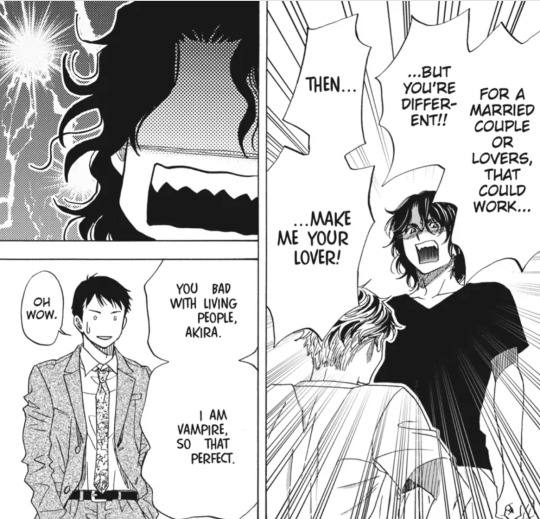
The Vampire and His Pleasant Companions isn't the best work of vampire fiction I've ever read, but it uses its recurring themes of isolation vs. the need for connection to craft an enjoyable narrative. One that I feel lingers in my mind a bit more than others. While Al's unique form of vampirism leads to some absurd escapades, the story is elevated by having its emotional core remain grounded in the intrinsic beauty of everyday human interaction and how even fundamentally different people can connect in small but significant ways.
Blah blah blah, you should check it out, I can't wait for the next volume, etc.
#kyuketsuki to yukai na nakamatachi#the vampire and his pleasant companions#ragawa marimo#marimo ragawa#konohara narise#narise konohara#ramblings#random manga i recommend#this is totally incoherent#i'm sorry i've got so much going on right now#but i wanted to plug this title and mention a few bits that stood out to me#because this is a solid series that deserves more attention in english-language spaces#i'm just sadly too exhausted to make a lot of sense#hope you get what i'm trying to say#and if not well whatever#go check out the series anyway
66 notes
·
View notes
Text
Rei Reviews- Michiko to Hatchin

One of my goals that I hope to achieve with my reviews, is not only to use them to convey my general opinions on a certain show, but also to bring attention to anime that I believe are rather overlooked. There is a huge quantity of obscure, hidden gems in anime, whether it’s because they didn’t have as much audience during the time they aired, or because they aired in a season which had stiff competition. And thus, I always love to discover and watch these types of shows, and to see what kind of potential they hold in store despite their lack of popularity.
Michiko to Hatchin happens to be an anime I think is rather overlooked. It was a financial failure for the studio that produced it because of a lack of audience and was overshadowed by other anime that aired in the same season. On another hand, the show started airing on Adult swim’s Toonami block in 2015 and this definitely helped it to gain more awareness from the anime community. Unfortunately, not everyone (and by everyone, I mean those who do not live in the US) has access to Toonami so I bet there are plenty of anime fans who are rather unfamiliar with the show.
So, is Michiko to Hatchin really the hidden gem I’m building it up to be, or does it deserve to fade into obscurity? Well, that’s why I’m here to examine the strengths and weaknesses of the show and ultimately tell you if it’s worth a watch!
The Substance Michiko to Hatchin is a 22 episode anime that aired during the fall season of 2008. It was produced by the late studio Manglobe (responsible for creating shows like Samurai Champloo, Ergo Proxy and Samurai Flamenco), and was the directorial debut of Sayo Yamamoto who recently worked on the highly-acclaimed Yuri!! ON ICE.
This anime focuses on the story of Michiko, a badass yet reckless jailbird who escaped from prison, and Hana “Hatchin” Murenos, a good natured but stubborn nine-year-old orphan who joined Michiko to escape her abusive family. This unlikely duo is traveling the Brazil-inspired country of Diamandra to search for a man named Hiroshi, Michiko’s former boyfriend who may be Hatchin’s biological father; all while running away from the police and the criminal syndicate Monstro Preto, that Hiroshi and Michiko used to be a part of.
With each passing episode of the anime, Michiko and Hatchin encounter an ensemble of colorful and interesting characters. Each one of the said characters has their own self-contained story which gives the audience a glimpse into their fascinating and usually very harsh life style: whether it’s a prostitute who wants to run away from debt with her younger sister, a young boy who suffers from short term memory loss, or a travelling circus that gets extra money in illegal ways.
Most of those stories manage to stand alone on their own thanks to the fascinating and diverse supporting cast, which is not only diverse in personality, but also in appearance. but above all, the stories always manage to connect to the main characters. Sometimes the stories help to establish the kind of relationship Michiko and Hatchin should aspire to achieve between each other, other times they make our duo question their desires such as finding Hiroshi. After all, Hiroshi remains a mystery for a majority of the show and there’s always a looming suspicion he’s not the person Michiko and other characters build him up to be.
Obviously, not all the self-contained episodes in the show were equally well written so there are some duds here. But it was still a refreshing way to develop Michiko and Hatchin’s relationship which is the heart and soul of the story. In the beginning our two heroines don’t get along very well with each other. Michiko’s recklessness and brash decisions don’t mesh well with Hatchin’s moral compass and this leads to many arguments between them. But they gradually warm up to each other thanks to their shared experiences and even though they still bicker, their dynamic interactions feel very genuine and it really made me root for them in their search for Hiroshi.
The way their search ends however, isn’t as strongly executed as it could’ve been. I won’t delve into spoilers, but I felt the way the story ended felt rather rushed. I definitely see what the show was aiming for, as it showed that the most important thing our main leads earned was their relationships, and I definitely appreciate that the show wanted to give the show an ending that’ll fit the circumstances of the setting, but the execution of the ending still felt kinda lacking.
Another issue that I have with the series is how it handles the character of Atsuko Jackson, a top-notch police officer who was Michiko’s rival. During the show, Atsuko exhibits mixed feelings towards Michiko and the act of chasing her because they used to be childhood friends and because she seems to be enjoying the chase. She constantly plays the role of an antagonist to Michiko’s actions but at times she also becomes somewhat of an ally of hers. And this aspect of Atsuko’s character made her very interesting to watch because the viewer can understand where those feelings come from. But at the end of the day, I didn’t really feel that Atsuko’s character went through a major arc and it didn’t really get a solid resolution by the end of it all. And yes, I am aware that was intentional to make the show more “realistic” but in my eyes, it wasted some of the potential the character had.
But even despite those gripes, I still found Michiko to Hatchin to be a very entertaining anime and a lot of said entertainment comes from the top-notch presentation.
The Presentation It’s a real shame that Studio Manglobe disbanded two years ago. Although I didn’t watch every show they produced, I have a deep appreciation of the amount of creative control it gave to its staff because the amount of talent and passion they gave to anime like Michiko to Hatchin really make them stand out. The visuals of the show are filled with a lot of style. The character designs are filled with diversity and really fit its setting and their expressions and body language are authentic. The backgrounds also manage to capture the exotic yet unkempt nature of Diamandra, and the amount of realistic detail that went into the building designs is especially impressive.
The animation itself is also above par. The action scenes in this show are extremely well choreographed and have a sharp and consistent flow that keep them exiting; and flow is definitely one of the biggest attributes of the presentation because each scene in the show perfectly transitions into another. And it’s all thanks to Sayo Yamamoto’s skill as a director.
The music in the show was composed by Shinichiro Watanabe, who directed Cowboy Bebop, Space Dandy and Samurai Champloo. In all honesty, the man makes for a better director than a composer because even though the style of the music in the show was very fitting, none of it really stood out or blew me away. The opening on the other hand is both a perfect fit to the show and great for a stand-alone listening. The song “Parasio” by Soil & Pimp Sessions is catchy and filled with a lot of flair, and the animation shows its liveliness both with its use of colors and with how it syncs up with the music. It managed to excite me for the episode that came after it in the best way possible.
As for the voice acting, I’ve only watched the show in English (and I’ll just say this right now: I usually tend to watch anime dubbed if there is a dub) and it definitely was a very good dub. A lot of the voice actors manage to deliver solid performances but the two standout roles belong to Jad Saxton as Hatchin and Monica Rial as Michiko. The two actresses shared a great chemistry that perfectly portrayed their respective characters and I’m still surprised that Rial was, in fact, Michiko’s voice actress because she usually voices characters with a higher pitched voice and youthful nature. So yeah, Kudos to her!
Final Verdict While I can’t say that Michiko to Hatchin is one of the best action anime out there, it’s still a show I believe deserves more attention because of how different it is from the norm. While the conclusion of the show wasn’t the most fulfilling, the show had a lot of passion poured into it and the two main leads really provided the show’s heart.
I highly recommend this anime to fans of a good action anime, and to those who look for anime with a more “western” appeal like Cowboy Bebop or Space Dandy. It’s also a good anime for people who want to see an anime with more diversity because this is a show that’s filled with well written, diverse characters. Just keep in mind that the violence in the show can get pretty graphic and the topics the show tackles can get rather profane
And with that, I hope that this review convinced you to check out Michiko to Hatchin because like I said before: it’s a hidden gem that deserves a time to shine.
65 notes
·
View notes